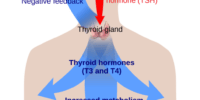How Hormones Can Control Appetite

Hormones play a crucial role in appetite control, influencing our eating habits and overall health.
Understanding how hormones regulate appetite can help us manage our food intake and achieve a healthier lifestyle.
Key Takeaways
- Hormones, such as melanocyte-stimulating hormone (MSH) and ghrelin, play a crucial role in appetite regulation.
- The hypothalamus is the key brain region controlling feeding and hunger, and dysfunction in this area can lead to eating disorders.
- Neurons in the hypothalamus, specifically the ventromedial hypothalamus, have multiple populations that either promote feeding or inhibit it.
- Factors like sunlight exposure and touch receptors in the mouth can influence appetite and eating preferences.
The Role of Hormones in Appetite Regulation
Hormones play a crucial role in the regulation of appetite, influencing hunger and satiety signals in the brain and body. When it comes to weight management, hormonal imbalances can disrupt the delicate balance of appetite control.
Hormones such as ghrelin, leptin, and melanocyte-stimulating hormone (MSH) are key players in this process. Ghrelin, released from the gastrointestinal tract, activates hunger and stimulates brain areas that make you want to eat. Leptin, produced by fat cells, signals satiety and helps regulate energy balance. MSH, released from the pituitary gland, reduces appetite.
Hormonal imbalances, such as elevated levels of ghrelin or reduced levels of leptin, can lead to increased appetite and overeating. Understanding the role of hormones in appetite regulation is essential for maintaining a healthy weight and promoting overall well-being.
Neural Control of Hunger and Satiety
What are the neural mechanisms that control hunger and satiety in the brain?
The neural control of hunger and satiety involves complex interactions between various brain regions and hormones. Here are some key factors:
- The impact of stress on hunger and satiety: Stress can affect appetite regulation by altering the release of hormones such as cortisol. Chronic stress may lead to increased food intake and weight gain.
- The role of gut microbiome in appetite regulation: The gut microbiome plays a crucial role in appetite regulation through the production of hormones and metabolites. Imbalances in the gut microbiome can disrupt appetite control and contribute to overeating.
Understanding the neural control of hunger and satiety is essential for developing strategies to manage appetite and promote healthy eating habits. Further research is needed to uncover the intricate mechanisms involved in appetite regulation and explore potential therapeutic interventions.
The Hypothalamus: The Feeding Control Center
The hypothalamus, a vital region of the brain, serves as the control center for regulating feeding and hunger. It plays a crucial role in integrating signals from the body and environment to maintain energy balance.
One important aspect of hypothalamic regulation is the role of the gut microbiome. Emerging research suggests that the gut microbiota can influence the activity of hypothalamic neurons involved in appetite control. The composition and diversity of gut bacteria may impact hormone secretion and signaling pathways within the hypothalamus, ultimately affecting appetite and food intake.
Additionally, stress hormones, such as cortisol, have been shown to influence appetite control. Elevated levels of stress hormones can lead to increased food intake and the preference for high-calorie foods.
Understanding the intricate interplay between the gut microbiome and stress hormones in hypothalamic regulation is crucial for developing strategies to control appetite and promote healthy eating behaviors.
Understanding the Ventromedial Hypothalamus
The ventromedial hypothalamus, a distinct region within the brain, plays a critical role in regulating feeding behavior and satiety. Understanding the mechanisms involved in the ventromedial hypothalamus can provide valuable insights into appetite regulation.
Here are the key points to consider:
- The role of leptin in appetite regulation: Leptin, a hormone produced by fat cells, acts on the ventromedial hypothalamus to suppress appetite. It signals the brain when energy stores are sufficient, leading to reduced food intake.
- The impact of stress on the ventromedial hypothalamus: Chronic stress can disrupt the normal functioning of the ventromedial hypothalamus, leading to dysregulation of appetite. Stress hormones like cortisol can interfere with the signaling pathways involved in appetite regulation.
- Other factors influencing the ventromedial hypothalamus: In addition to leptin and stress, other hormones and neurotransmitters, such as insulin and serotonin, also play a role in modulating the activity of the ventromedial hypothalamus.
Understanding the intricate mechanisms within the ventromedial hypothalamus can provide valuable insights into developing strategies for appetite control and promoting healthy eating behaviors.
The Insular Cortex and Food Enjoyment
Understanding the intricate interplay between the ventromedial hypothalamus and other brain regions, such as the insular cortex, can shed light on the fascinating role of the insular cortex in food enjoyment and satiety.
The insular cortex is a brain region involved in processing information about internal bodily states and plays a crucial role in influencing enjoyment, avoidance, and satiety related to food.
One interesting aspect of the insular cortex’s involvement in food enjoyment is its connection to touch receptors in the mouth. These touch receptors influence food preferences and can determine whether or not someone wants to eat a certain food based on its texture or consistency. This connection highlights the influence of touch on food preferences and suggests that individual preferences for certain food consistencies can be highly subjective and learned.
Understanding the role of the insular cortex in food enjoyment can have implications for addressing food addiction and for developing strategies to promote healthier eating behaviors.
Factors Influencing Eating Preferences
Factors influencing eating preferences encompass a wide range of variables that can shape an individual’s choices and enjoyment of different foods. These factors include:
- Cultural influences on eating preferences: Cultural background plays a significant role in shaping an individual’s food choices. Different cultures have distinct culinary traditions, preferences for certain flavors or spices, and dietary customs. These cultural influences can greatly impact an individual’s food preferences and the types of foods they find enjoyable.
- The role of touch receptors in food enjoyment: The touch receptors in the mouth play a crucial role in determining an individual’s enjoyment of food. The texture, consistency, and mouthfeel of food can greatly influence preferences. Some individuals may find pleasure in chewing or tactile sensations, while others may have aversions to certain textures. The role of touch receptors in food enjoyment highlights the importance of individual preferences and the subjective nature of taste.
Parabiosis Experiment: Unveiling the Role of Hormones in Hunger
Closely examining the factors that influence eating preferences, such as cultural background and touch receptors, can provide valuable insights into the complex interplay between hormones and hunger.
This is demonstrated by the intriguing Parabiosis Experiment. This experiment involves linking the blood supply of two animals.
In the experiment, lesioning the ventromedial hypothalamus in one rat caused obesity, while the connected rat lost weight.
The exchange of factors in the blood between the rats indicated the involvement of hormones in hunger and appetite.
These findings have significant implications for obesity research and understanding the role of hormones in appetite control, particularly in eating disorders.
The Arcuate Nucleus and PMOC Neurons in Appetite Control
The arcuate nucleus and PMOC neurons play a crucial role in the regulation of appetite. These are the key components in the brain that contribute to the control of feeding and satiety. Understanding the role of the arcuate nucleus and PMOC neurons in appetite control provides valuable insights into the complex mechanisms underlying hunger and satiety.
Here are three important points to understand about their role in appetite regulation:
- Role of PMOC neurons in appetite regulation:
PMOC neurons, found in the arcuate nucleus, produce Alpha MSH, a hormone that influences feeding and appetite. Understanding the function of PMOC neurons provides insights into the control points for regulating appetite. By targeting these neurons, it may be possible to develop interventions to manage appetite and promote healthy eating habits.
- Influence of ultraviolet light on MSH release:
Melanocyte-stimulating hormone (MSH), which reduces appetite, can be activated by exposure to ultraviolet (UV) light. Sunlight exposure stimulates MSH release, leading to a decreased appetite or easier appetite control. Therefore, getting ample sunlight, especially UV light to the eyes, can help regulate appetite and promote healthy eating behaviors.
- Connection between PMOC neurons and appetite control:
PMOC neurons have a direct connection to the ventromedial hypothalamus (VMH), another critical brain region involved in appetite regulation. This connection suggests that PMOC neurons play a role in the overall coordination of feeding behavior and the regulation of appetite.
Further research in this area may lead to the development of targeted interventions for appetite regulation and the promotion of healthy eating habits.
Melanocyte-Stimulating Hormone (MSH) and Appetite Reduction
PMOC neurons in the arcuate nucleus, which play a crucial role in appetite regulation, are closely linked to the release of Melanocyte-Stimulating Hormone (MSH), a hormone known for its ability to reduce appetite and promote satiety.
MSH can be activated by ultraviolet (UV) light to the eyes, making sunlight exposure an important factor in MSH release. It binds to receptors in the body and controls appetite.
On the other hand, ghrelin, a hormone released from the gastrointestinal tract, activates hunger and stimulates brain areas that make you want to eat. Ghrelin levels are influenced by factors such as sleep deprivation, increasing before meals and decreasing after eating.
Understanding the role of MSH and ghrelin in appetite regulation provides valuable insights for controlling appetite and maintaining a healthy weight.
AgRP Neurons: Stimulators of Eating
AgRP neurons, known as orexigenic neurons, are key players in stimulating eating behavior. These neurons play a significant role in feeding behavior and have been implicated in the development of obesity.
Here are three important points about AgRP neurons and their role in appetite regulation:
- AgRP neurons and feeding behavior: AgRP neurons are activated when an individual is in a fasting state, leading to an increase in appetite and food-seeking behavior. These neurons send signals to other brain regions involved in hunger and feeding, promoting the consumption of food.
- The role of AgRP neurons in obesity: Dysfunction or dysregulation of AgRP neurons can contribute to the development of obesity. When these neurons are overactive or continuously stimulated, it can lead to hyperphagia, or excessive eating. This dysregulation can disrupt the balance between energy intake and expenditure, contributing to weight gain and obesity.
- Potential therapeutic targets: Understanding the mechanisms and pathways involved in AgRP neuron regulation may provide insights into potential therapies for controlling appetite and managing obesity. Targeting AgRP neurons or the signaling pathways associated with them could help modulate feeding behavior and potentially aid in weight management.
The Impact of Ghrelin on Hunger and Meal Timing
Dysfunction or dysregulation of AgRP neurons can contribute to the development of obesity. Another hormone that plays a significant role in appetite regulation is ghrelin. Ghrelin, often referred to as the ‘hunger hormone,’ is released from the gastrointestinal tract and stimulates the brain areas responsible for increasing appetite. It creates food anticipatory signals within the nervous system, making you want to eat. Ghrelin levels increase before meals and decrease after eating.
Various factors, such as sleep deprivation and stress, can influence ghrelin secretion. Additionally, ghrelin activates neurons in different locations, including the PMOC neurons and VMH, further contributing to its impact on hunger and meal timing. Understanding the impact of ghrelin on hunger and meal timing is crucial in comprehending the intricate role of hormones in appetite regulation.
Frequently Asked Questions
How Does Sunlight Exposure Affect Appetite and Hunger Levels?
Sunlight exposure can affect appetite and hunger levels. Getting enough sunlight, especially UV light to the eyes, can stimulate the release of melanocyte-stimulating hormone (MSH), which reduces appetite. Sunlight exposure reduces appetite or makes it easier to control.
What Factors Influence the Release of Ghrelin, the Hunger-Stimulating Hormone?
Factors such as stress and sleep deprivation can influence the release of ghrelin, the hunger-stimulating hormone. Both stress and lack of sleep can lead to increased levels of ghrelin, which can result in higher hunger levels and a greater desire to eat.
Can Lesions or Stimulation of Agrp Neurons Affect Eating Behavior in Humans?
Yes, lesions or stimulation of AgRP neurons can affect eating behavior in humans. Lesions can lead to appetite change, while stimulation can influence food-related excitement or anxiety. AgRP neurons have a connection to the ventromedial hypothalamus.
What Role Does the Insular Cortex Play in Influencing Food Enjoyment and Satiety?
The insular cortex plays a crucial role in influencing food enjoyment and satiety. It processes information about internal bodily states and influences cravings and portion control. Understanding the mechanisms in the insular cortex can help regulate eating behaviors.
How Does the Touch and Tactile Essence of Food Affect Individual Eating Preferences?
The touch and tactile essence of food can significantly affect individual eating preferences. Food texture plays a crucial role in sensory perception, influencing whether someone finds pleasure in chewing or the tactile sensations of food. Cultural background and personal preferences also contribute to these preferences.









